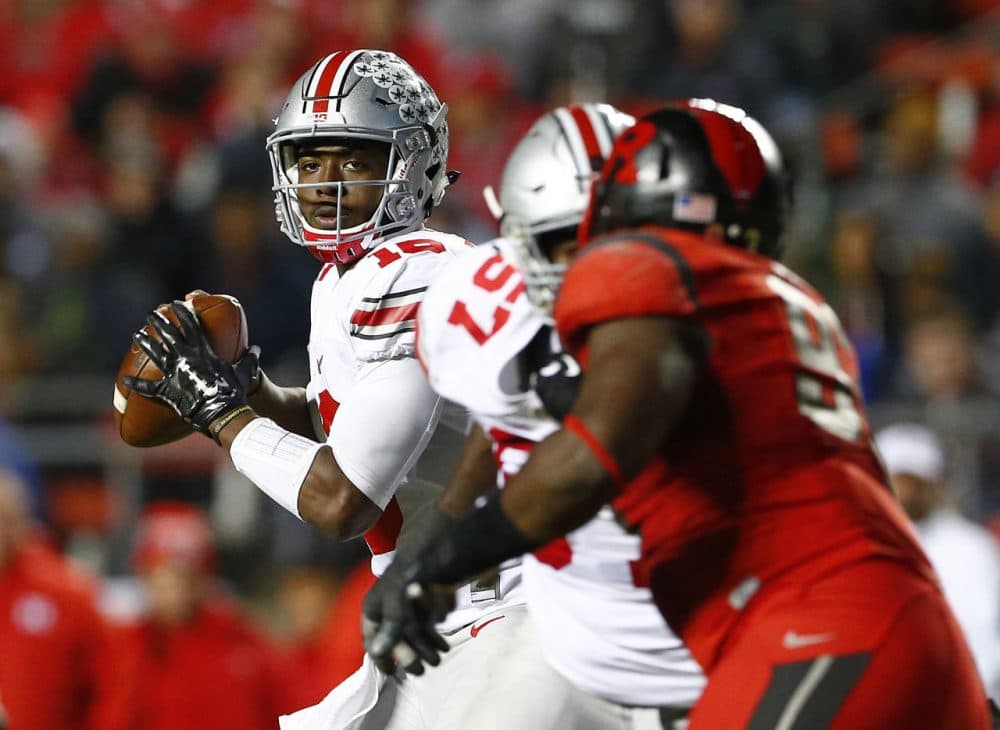Advertisement
3 Stories You Should Know: Ohio State OUI, Daniel Murphy, Paid Patriotism
Resume
The decision to revoke a scholarship from Ohio State quarterback J.T. Barrett raised some eyebrows this week. Ohio State is withholding the money as part of Barrett's punishment for getting arrested on an OUI charge. That's the first story in this week's "3 Stories You Should Know."
Patrick Hruby of Vice Sports and espnW's Kate Fagan join Bill Littlefield.
1. Ohio State QB Punished For OUI, Scholarship Revoked Temporarily
Ohio State quarterback J.T. Barrett was arrested last Saturday for operating a vehicle while under the influence. Buckeyes coach Urban Meyer decided Barrett's punishment would be a one-game suspension and the revocation of scholarship money for summer classes. Patrick Hruby believes this is yet another example of hypocrisy in college sports.
They actually take away the opportunity for athletes to get educated. In theory that's what this is supposed to be all about. I think what this really shows it that this is actually all about power.
Patrick Hruby, Vice Sports
PH: This is a bigger problem, I think, in the college sport system. Where you see schools get into trouble with the NCAA, they break rules, they get violations. How are they punished? They take away scholarships. No money is taken out of a coach's pocket or an athletic director's pocket. Instead, they actually take away the opportunity for athletes to get educated. In theory, that's what this is supposed to be all about. I think what this really shows it that this is actually all about power. This is where the schools, and the administrators and the coaches can drop the hammer on these athletes, and so they do it.
2. Rooting For A Player Who Doesn't Root For You
New York Mets second baseman Daniel Murphy notched a record-breaking performance this postseason. But during spring training, Murphy made headlines when he said that, as a Christian, he could not support the homosexual "lifestyle" of MLB "Ambassador for Inclusion" Billy Bean. Kate Fagan recently wrote about her complicated response.

KF: I found myself wondering how I felt about this once the Mets started to play well and Daniel Murphy hit home runs in six consecutive games, and a friend of me at ESPN asked, "Well, aren't you mad at Daniel Murphy?" And my response was, "No, I'm not mad." As one of my friends said, if we just turned our backs on Daniel Murphy, or if I said I'm not going to root for him, I dismiss him---where would the path forward be between religion and sexuality? And that's still a place in our society, unlike some other -isms, where we need to have conversations. And so I kind of ended in this place being like, "I'm still going to root for him because I choose to keep that path open."
3. Paying For Patriotism in Sports
A Congressional report out this week detailed money paid by the Department of Defense to sports teams to sponsor patriotic tributes. According to the report, the DoD has paid major league teams at least $6.8 million since 2012 to promote the honoring of American soldiers. Teams from the NFL, MLB, NHL and MLS all received taxpayer funds through this program. Bill Littlefield thinks that this is a practice that has to go, or at the very least, be publicly advertised.
BL: This has angered people on both sides of the political aisle, but for different reasons. Personally, I would like to see the partnership end entirely, because pairing a pro sports team with the military sends the message that a team is a team, no matter what its mission. And rooting for a ball team is generally harmless, rooting for a war is not. But if the teams are going take money from the Defense Department, they should at least acknowledge that these are paid advertisements, just like the ads during televised games selling beer and insurance.
More Stories You Should Know:
This segment aired on November 7, 2015.